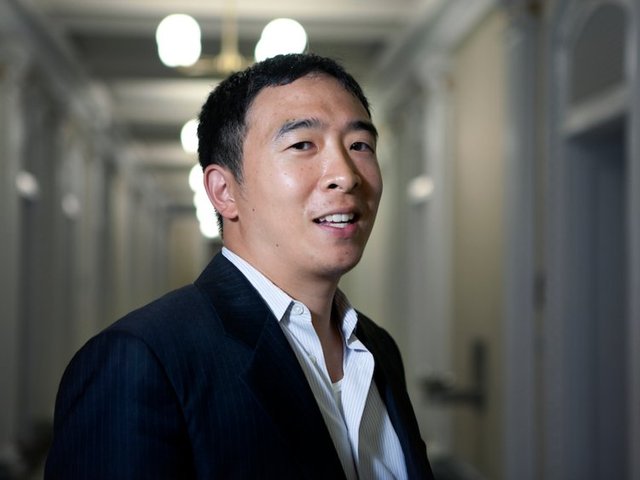Pushing the conversation forward
It's probably apparent to anyone that follows this little blog of mine that I'm a fan of Asimov's work. Of course, his body of work was not exclusive to sci-fi futurism, but it's precisely in those classics that I find myself lost in thought and quite often too.
Funny thing is that recently I've been thinking about it a lot more and it's mostly because there's been a new democratic presidential candidate making his rounds and showing up in almost every corner of the internet you can think of, his name, Andrew Yang.

The unavoidable subject
At times I worry that his candidacy will fail to bring the issues into a brighter light, which to me is the true victory of these conversations, simply because he seems to focus almost exclusively on his UBI proposal. The idea that under his presidency, every adult would receive $1000 a month as a citizen of this country.
As you might imagine, such talks make him somewhat controversial and for good reason. The conversation in our current social conundrum is always a tug of war between balancing evolving concepts of human rights while not undermining the value of merit, work and entrepreneurship. The subject is so complex that there is a collection of books to argue just about any position on the political spectrum on this very subject.
All this to say that the issue, the core problem is already here, we are living it, and it's progressively getting worse, as much as we might deny this to be the case.
In many ways we sit in awe of the advancements of technology while at the same time fail to calculate the downside these advances may have in our mental health. Self driving cars for example, sound amazing, but thinking about the thousands and thousands of people that this technology would effectively render unemployed, sounds dystopian, does it not?
What's more concerning to me is that we are not decades away from the disruption becoming quite painful, but we act as if we are, and it seems not everyone is opening their eyes wide enough these days. It's as if fax machine repair shops are still opening up, yet everyone is enjoying the convenience of emails more and more, but not many are making the connection.
Does Yang stand a chance?
Maybe not, but I'm not sure it matters if I'm to be honest. In other words, what might be valuable out of this whole thing is not that his ideas are implemented today, or more accurately said in 2020, but that we begin to attempt to implement possible solutions to social crisis that automation will bring about as soon as possible.
I know that to some, these words I'm typing are too Armageddonian to hold merit, but that's because they've not taken the time to analyse history and how disruptive technologies have eradicated, because that is the word, traditional ideas of macro economics.
To me, the fact that he's shown up, that he even got invited to the Joe Rogan experience, means that the tides are changing, it means that we are beginning to take this conversation seriously, and it somewhat gives me hope that we will eventually find the right answers, that elusive balance.
In my personal opinion this interview is a must regardless of your political inclinations. Do yourself a favor, give it a good listen, and allocate some mental power to this whole thing. I'm sure it will be time well spent.

Whether people in the US like it or not, there's a "regime shift" happening. It's very subtle, and has nothing to do with Donald Trump.
It has to do with the "gray hairs" losing their grip on the reins and the US joining much of the rest of the world in the sense that the people in government will no longer be 20 years older than the median age of the population, but close to the median age.
Whether you fall on the left or the right, there's a mindset change there... away from people who have already lived most of their life to people who still have a lot of skin in the game.
The generational shift also involves the first set of "Internet Natives" coming into power... and this brings us back around to people like Andrew Yang, Alexandria Ocasio-Cortez, Tulsi Gabbard and others like them coming to center stage, rather than being bit players who get shooed aside by an older "establishment" on both sides of the aisle.
There's also a new generation of "older" voters (my generation, 50-somethings) who are more concerned about what sort of world we are creating for our grandchildren — 30-40 years down the road — than about our own 80's style ostentatiousness and wealth accumulation.
I watch a lot of people older than me; late 60's, early 70's... who are still pointing to "government numbers" showing that there are more jobs than ever and more jobs predicted... while remaining oblivious to the fact that they are making their measurements with a yardstick that no longer applies.
I'm going to listen to the interview when I actually have the time... but I generally like how Joe Rogan tackles conversations like these.
@meno, UNIVERAL BASIC INCOME sounds effective, in my opinion realistically we have to see if it will be possible or not because i think that at one side governments are saying that the debt is increasing. Let's see how the world will move ahead in this decade. Stay blessed.
I will say US always takes headline content here on steemit. But actually this man looks like an actor i usually watched many times. I eas thought it was him
To listen to the audio version of this article click on the play image.

Brought to you by @tts. If you find it useful please consider upvoting this reply.
Good post! i'm watching the podcast now. Got me thinking about an argument/ criticism against UBI: "If people have more money in their hands then rents and whatnot will just increase and thus UBI solves nothing." That is not my criticism, but a criticism that i have heard and cannot as yet answer in a thoughtful way. Several questions break the criticism down into intellectually manageable pieces:
Did average prices rise when Alaska began giving citizens oil dividends? If so, did the increase exactly correspond with the income increase, or was it less, or more than the income increase?
Are there historical examples of national, or state/provence, wide dividends being given that did not result in average price increases?
If in some cases average prices increase, and in others they do not increase, what are the varied factors that determine the difference?
If average prices always increase when average incomes increase through national dividends what possible ways are their of preventing that?
Any systematic thought or factual knowledge out there on this topic?
Its simple in my mind; society with all the problems will not be willing to reach a consensus to attend its issues without the ability to take politics to the side!
Posted using Partiko iOS
Hi @meno!
Your post was upvoted by @steem-ua, new Steem dApp, using UserAuthority for algorithmic post curation!
Your UA account score is currently 5.979 which ranks you at #325 across all Steem accounts.
Your rank has not changed in the last three days.
In our last Algorithmic Curation Round, consisting of 187 contributions, your post is ranked at #20.
Evaluation of your UA score:
Feel free to join our @steem-ua Discord server